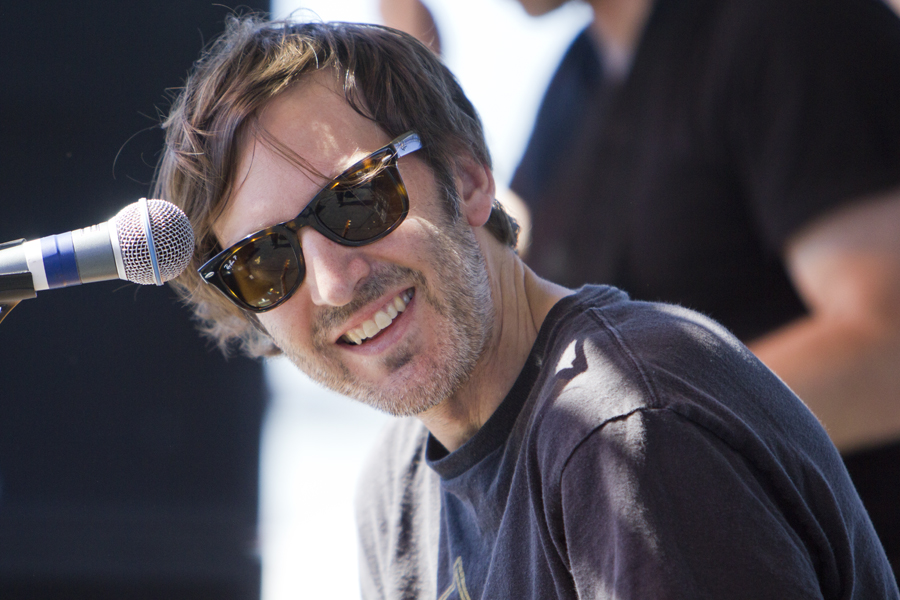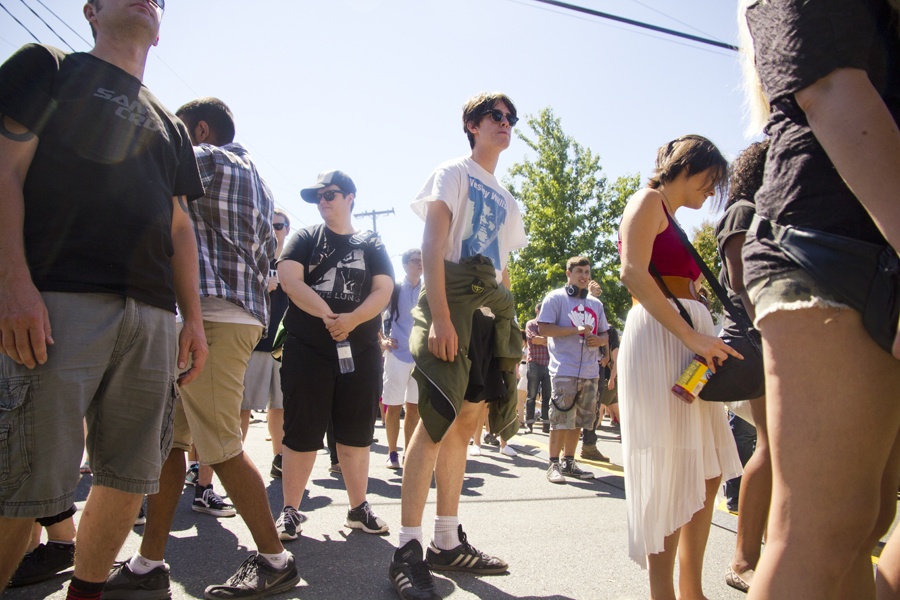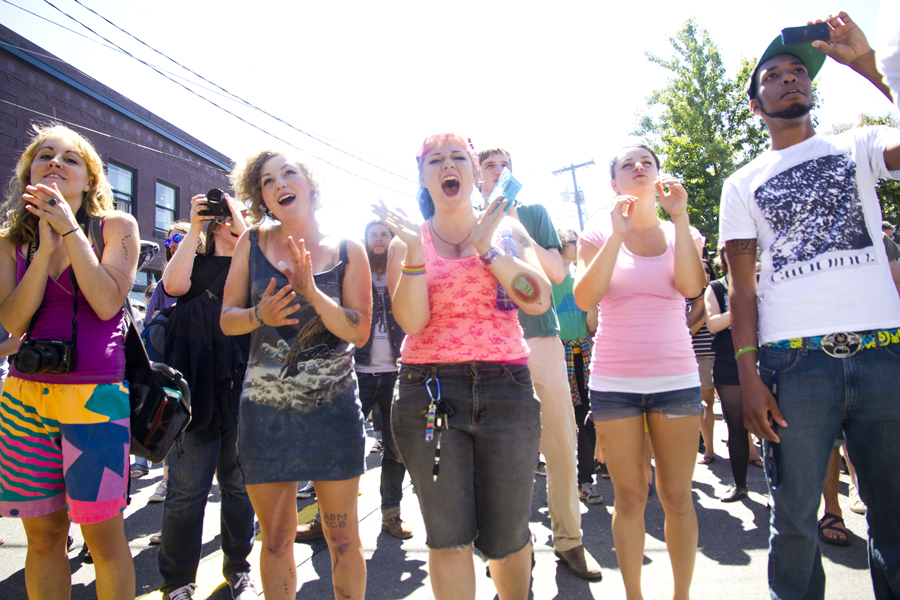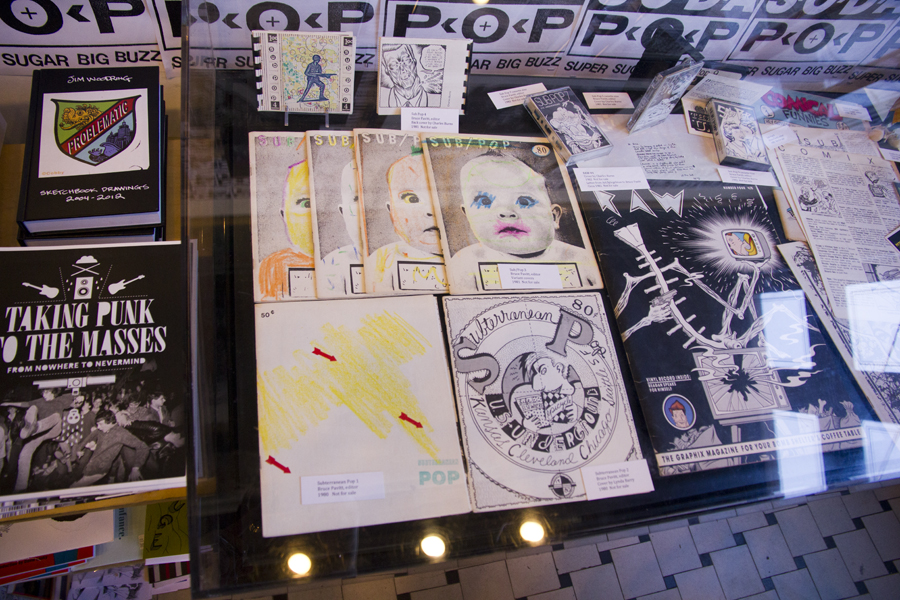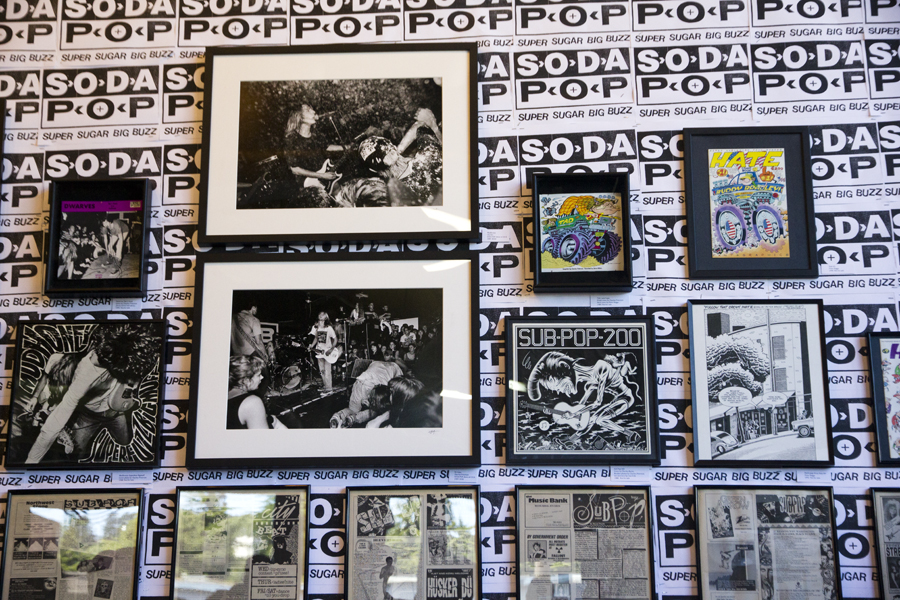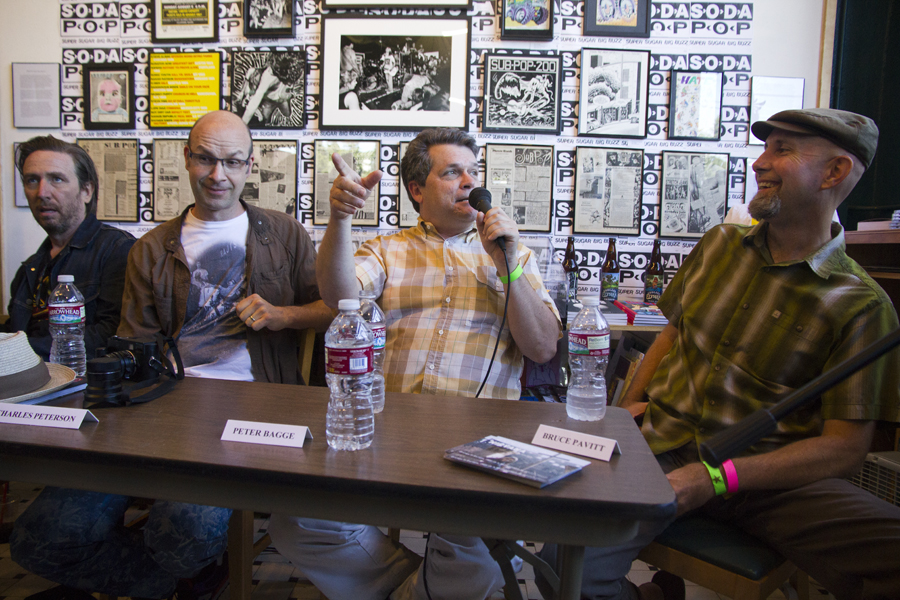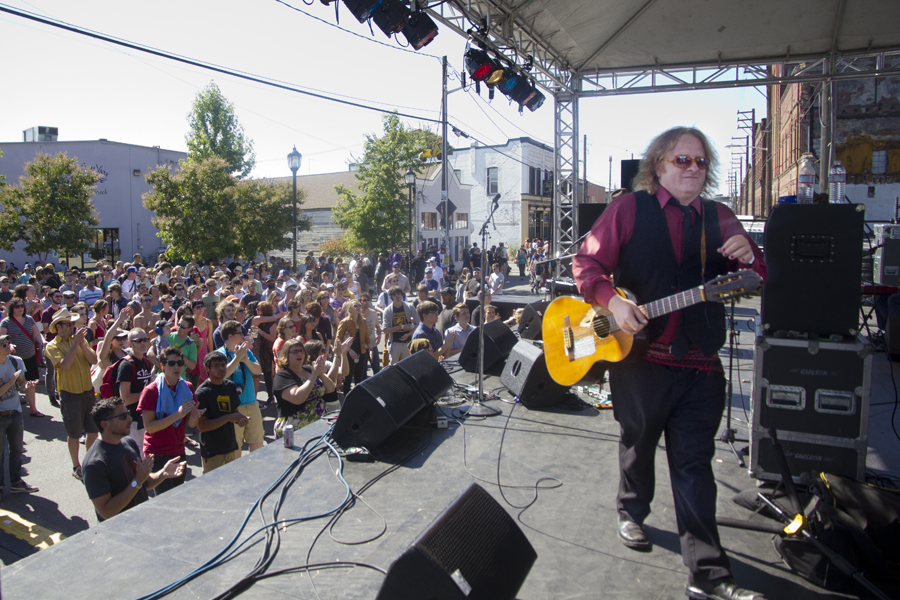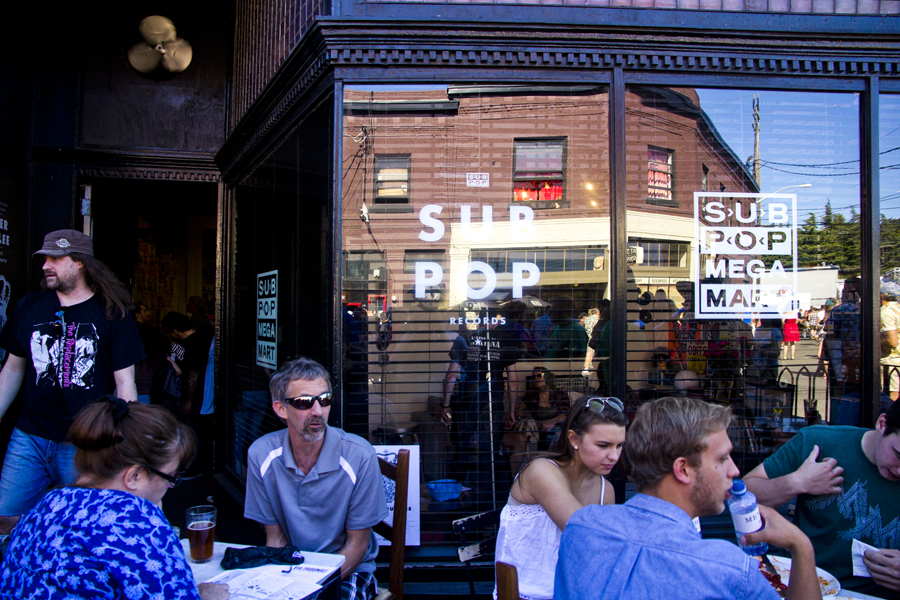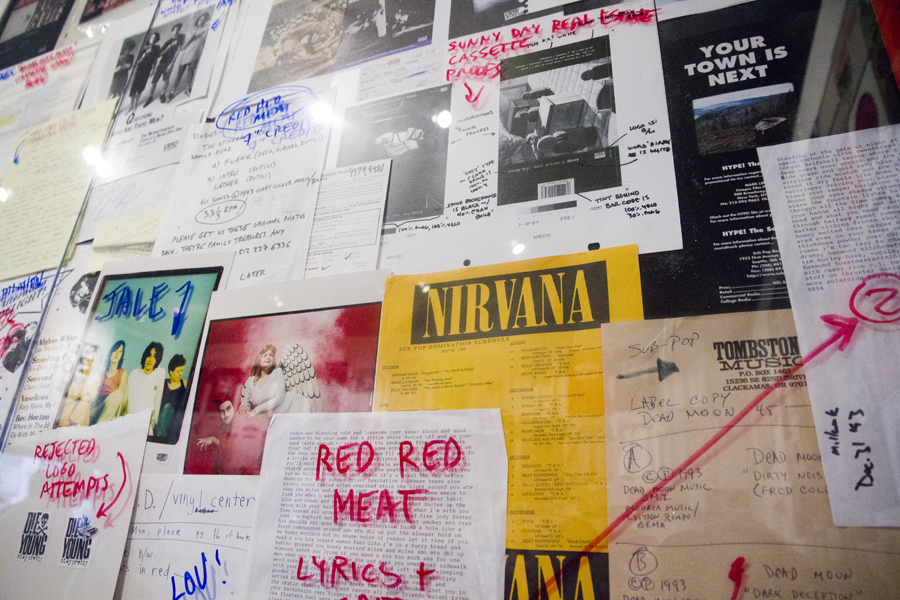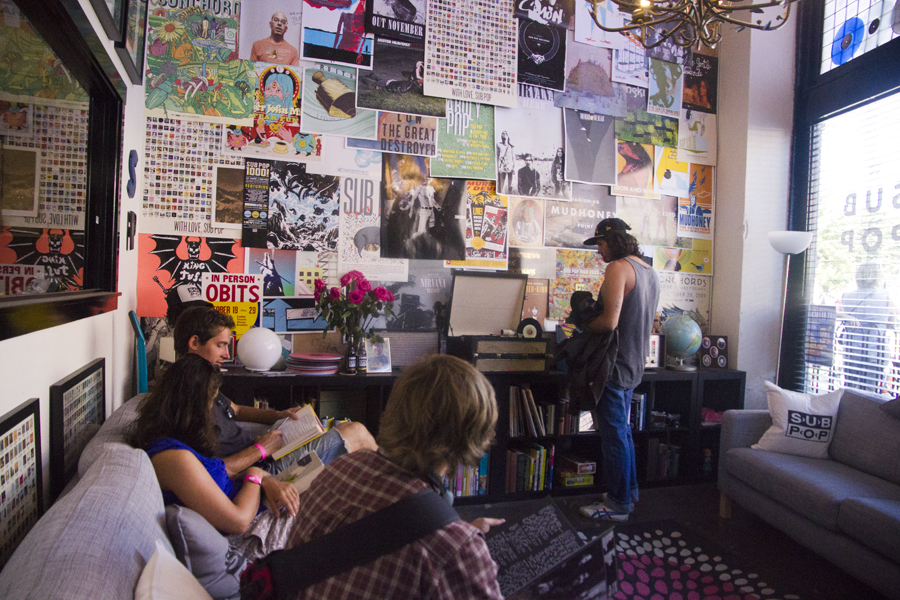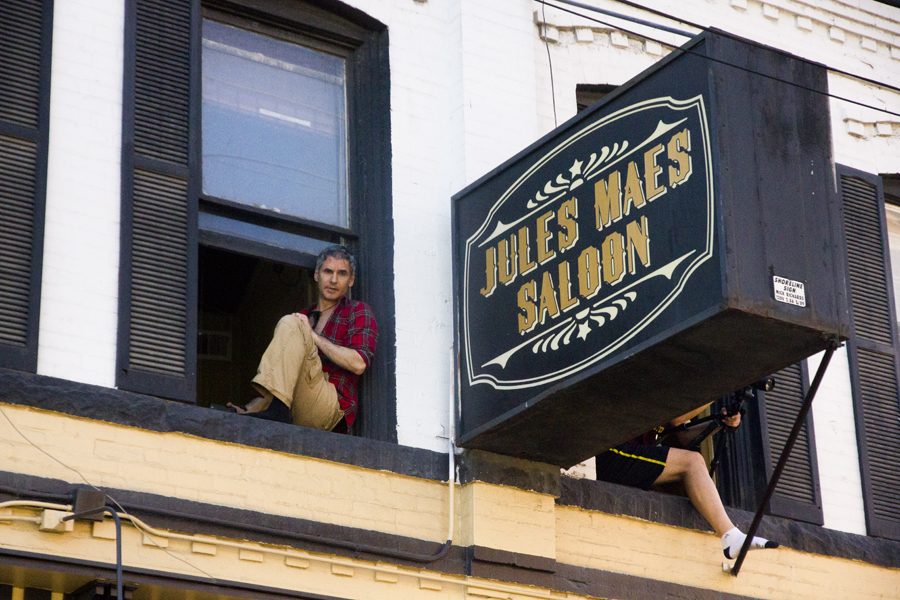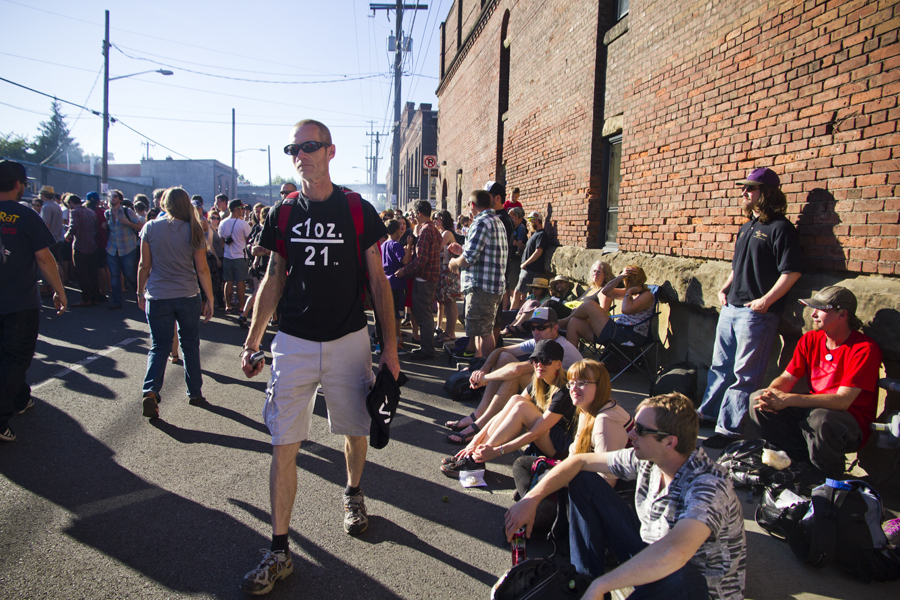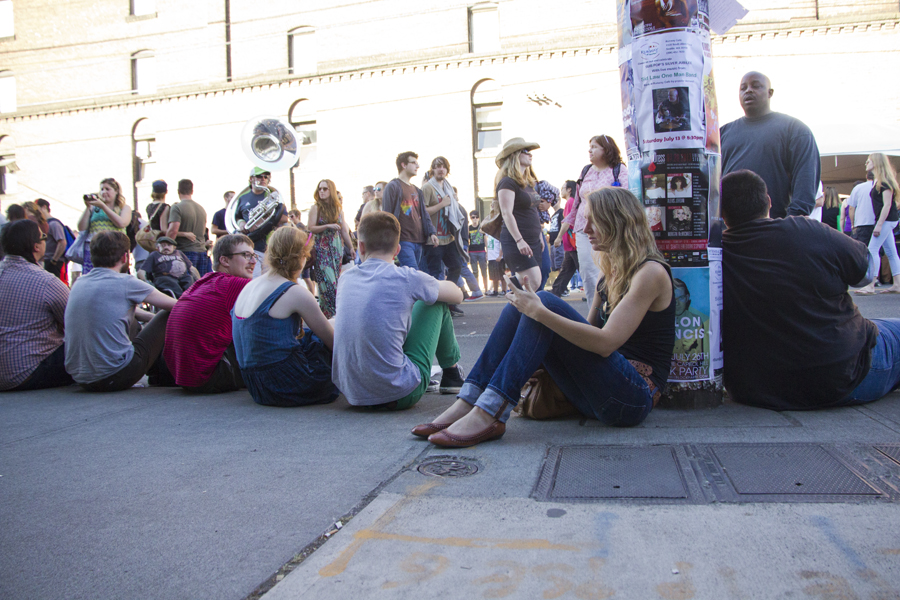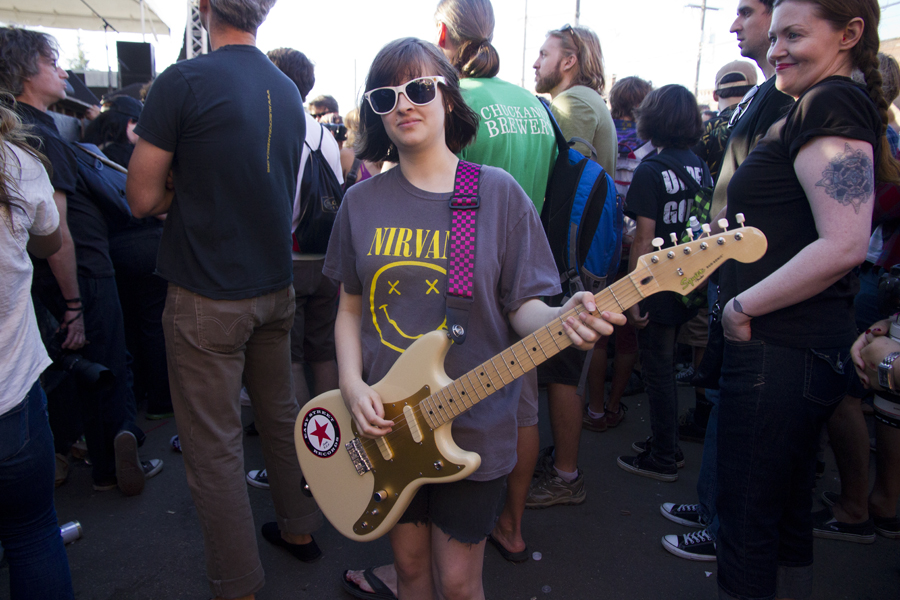The Baptist Generals’ Chris Flemmons has just exited the gated prepping area just off the side of a stage on a typical July day in Seattle. It’s only 74 degrees, but according to locals this feels hot. Flemmons is covered in sweat, and he’s being pestered for an interview. “Give me a moment,” Flemmons said. “I overheated up there.” He stealthily slips through the crowd, never to be seen for the rest of the music festival. Chris Flemmons is good at this evasiveness. He’s even better at making moments happen that seem never meant to be.
This show, which is billed as the Sub Pop Silver Jubilee, is one of those moments. Sub Pop Records, the pioneering label with the slogan of “World Domination” and responsible for the careers of groups like Nirvana and the Postal Service, is celebrating its 25th birthday party, and the Baptist Generals were invited. They’re the only band from North Texas so honored (also the only local band to call the label home). Two other groups, Fergus and Geronimo and Deep Time, include former North Texas residents (in the touring lineup in Deep Time’s case) on Sub Pop’s subsidiary label, Hardly Art.
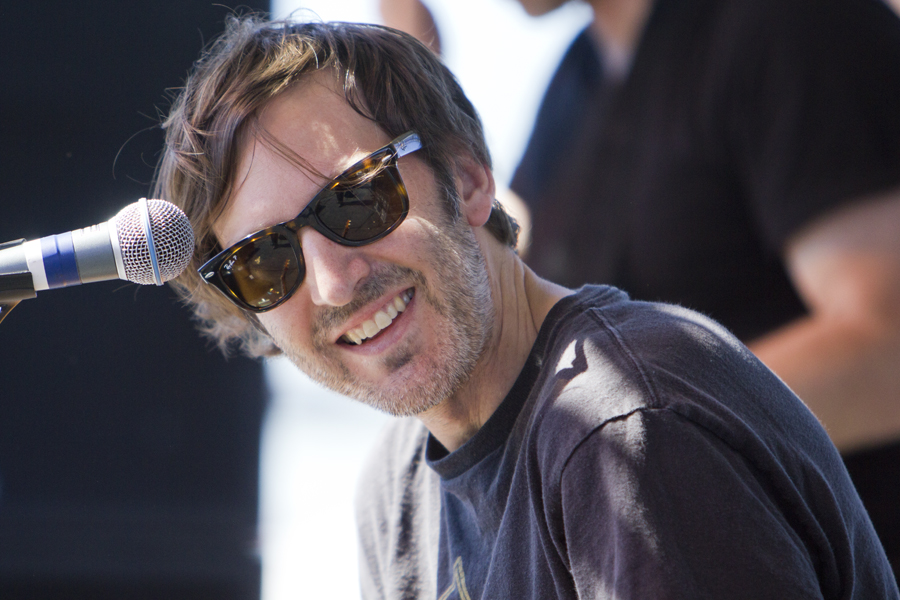


Somehow the Baptist Generals managed to cling to the venerable label for a decade of what seemed like mostly the inactivity of an impossible-to-please eccentric. But as years of speculative smoke clears, Flemmons is emerging as something of a long-game strategical genius, which stands in direct contrast to his oft whispered-about image as a wine-loving (yet mostly lovable) clown who is a bit too casual in both manner and dress in his regular dealings, whether they be business meetings or in-studio radio sessions. I wondered about how “overheated” he was in the excuse I was given by the band as to his whereabouts following the Generals’ performance. “He’s meeting with our lawyer,” says guitarist and keyboardist, Peter Salisbury. But is Flemmons a curmudgeonly wino who just happens to be on one of the most famous record labels in the world? Is it by accident that he was founder of what eventually became the most recognizable music fest in recent North Texas history? If you were to believe the hearsay, that would all seem very unlikely.
In reality, Flemmons is the man who shrewdly outsources and only makes a move when appropriate. He yielded his once near-total control of the 35 Denton music festival to a younger, more effervescent staff when he felt it was the right time. He then managed to stay on Sub Pop through various monsoons in the music industry, despite putting out his records 10 years apart. His ceding of control has even spilled over to his music, since each member of his carefully selected backing cast can fill in the gaps with unusually high-functioning capability, should he slip up.
The group did just that as his guitar amplifier stopped working with a dramatic choke in the middle of the group’s set. The performance was arguably one of their most important, since they were playing their second record, Jackleg Devotional to the Heart, to a crowd that was hoping for a quintessential Sub Pop experience. It was a crowd that may not have been as familiar with this Texas act, much less its new album. The potential lack of familiarity didn’t bother the band, however. “Seattle probably doesn’t know who we are,” says bassist Ryan Williams. “Which is nice.”
What’s also nice is to have a crew of overachievers casting such a wide net in this amp crisis. Among them, a radio personality to crack jokes with improvisational ease during the awkward silences (Paul Slavens); a technology geek who has his own tiny radio station in Denton, in order to check the integrity of the equipment (Peter Salisbury); or even a guy with the large-scale experience of helping to maintain a historic movie theater, for general all-purpose aesthetic concerns (Jason Reimer). Throw in the aforementioned Williams, and touring veteran Jeff Ryan, and there is very little for Flemmons to worry about, even if everything goes wrong. Though he had every right to go into a full-on rage, he exemplified the calmness that his cohorts provide. “I’m glad it’s dead,” Flemmons jokes during a between-song silence. “I’ve been trying to kill this thing for years.”
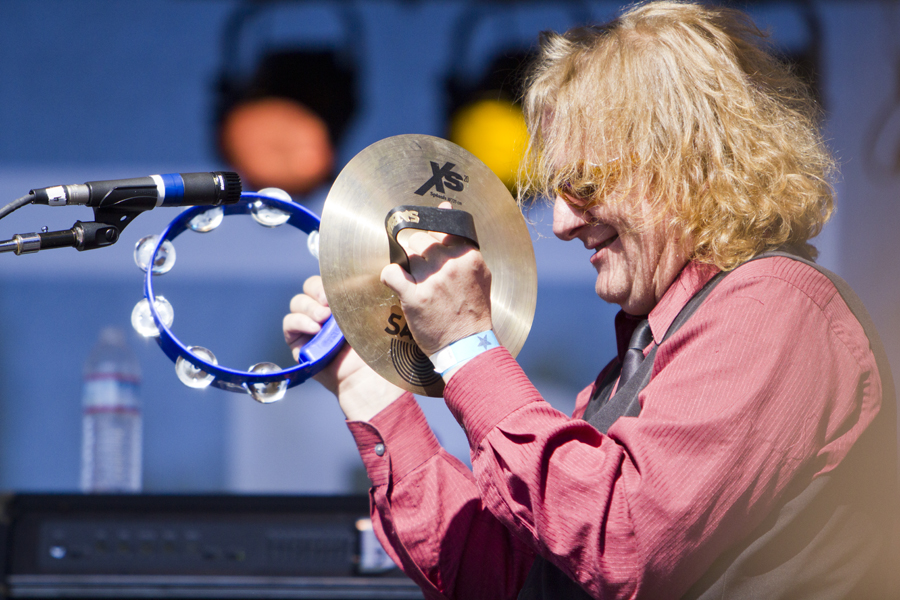
Following their show, the band, minus Flemmons, is attempting to cram a huge party into an overburdened bar and grill called Calamity Jane’s, in the Georgetown district of town, where the Jubilee was held. The restaurant serves Cheetos rather than bread and butter or chips and salsa. Thinking they’re free, the Generals humorously add an unnecessary $10 worth of junk food to their bill.
I ask multi-instrumentalist Paul Slavens how a show of this stature differed from an appearance at 35 Denton. “Artistic reasons,” Slavens said, smiling. “The sound system was completely comparable, not to take anything away.” Ryan Williams jumped in to agree: “Almost exactly the same.” And though it may have been a milestone in the group’s career, that didn’t necessarily register in the attendance for the group’s set specifically. “The crowd at 35 was bigger,” Slavens said.
When I asked the band if Flemmons was going to pull a Roger and Me by no-showing, they laughed with some sense of recognition. Even a brunch interview the next day proved to be impossible. I finally pinned him down by phone back in Dallas. When asked how his label has changed over the years, Flemmons says he doesn’t think it’s any different. “I have a hard time with people talking about ‘evil record label people’ and all that. Their support structure is about keeping it personal.” Flemmons said. “I’ve always felt lucky to be there, you know? Whether or not I had an album to release or not, 10 years later. To me that says a lot about them: to put out a record from a band that they haven’t seen anything from in 10 years, I mean. They’re all really sweet people. It’s like family.”
Flemmons says he had only one regret about the show, which has been a common one for him since 2010. “I wish Andy Kotowicz was there, the guy who signed us.” Kotowicz died tragically in 2010 in a car accident, while picking up his daughter from daycare. Onstage, the Baptist Generals dedicated their set to him.
Selling It
Before and after the Generals’ performance, Sub Pop blared, flashed, and sold constant reminders of its output, its past especially. There is a Sub Pop soda. The Jubilee has its own branded wine. There is a brick-and-mortar pop-up shop, not a mere booth, complete with precious memorabilia from floor to ceiling. There was even a Nordstrom booth, and the Seattle-based retailer encouraged fans to “Celebrate Sub Pop In Style” with Sub Pop-themed Tom’s shoes. Can you imagine Neiman Marcus doing the same for a Dallas record label?
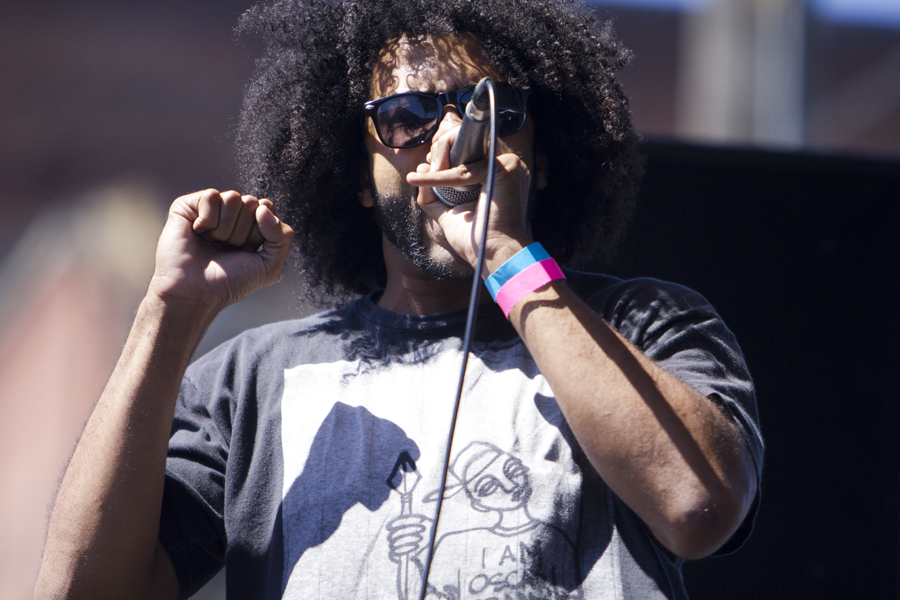
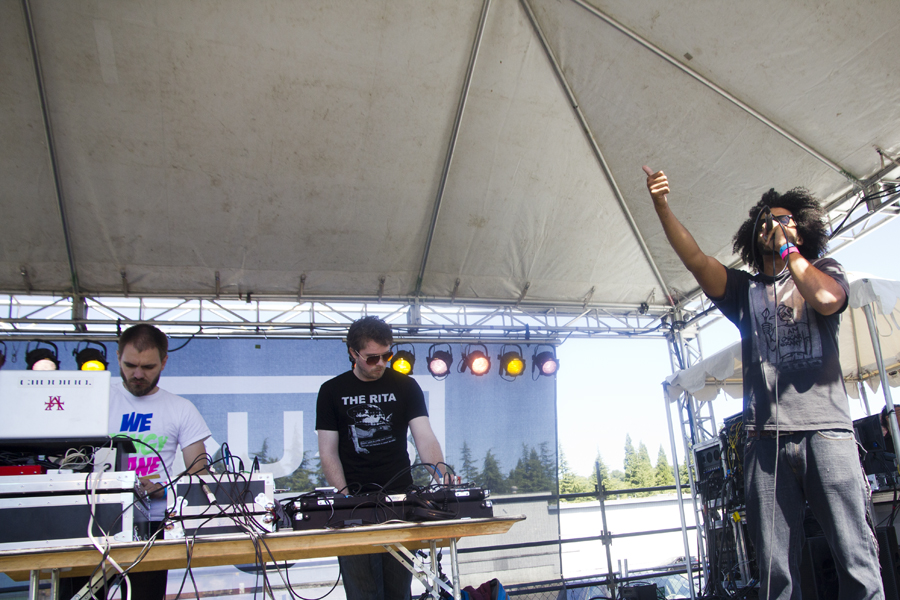
Nirvana’s “Love Buzz” pipes out of the PA before the Baptist Generals’ set begins. Just a few hours prior, a panel discussion featuring those heavily involved in Sub Pop’s early days takes place at Fantagraphics Comics, the well-known underground publisher with strong ties to the label that settled in Seattle in the late 1980s, and now also a comic book store that opened in 2006. It features Bruce Pavitt, the cofounder of Sub Pop; Peter Bagge, the author of the influential Hate, which both mined from and perpetuated regional stereotypes from the Pacific Northwest music scene of the early 1990s; Charles Peterson, the photographer responsible for the area’s trademark black-and-white concert photography; and author/musician Danny Bland.
Though the panel was extremely informative, and it was a thrill to hear Bagge speak in particular, having grown up on his R. Crumb-like habit of openly loathing the artists he literally cartooned, the Sub Pop founder Pavitt and his colleagues’ tendency to shamelessly speak of “world domination” and sell itself was on full display. To be fair, Pavitt is no longer connected to the label, having nobly left in the mid-90s due to a deal which saw half the label’s shares go to Warner Brothers. But in discussing his ebook focusing on Nirvana’s first European tour, Pavitt was very upfront about his intentions, however facetiously. “I have this box full of Nirvana photos, and I thought, ‘You know, if I put this together in a book, I could probably make a bunch of money. So that’s what’s going on here, but it actually is really awesome,” Pavitt said at the panel. “It worked for me,” quipped Charles Peterson. And indeed it has. Seeing Peterson’s work at the Experience Music Project’s Nirvana exhibition later that weekend, it became apparent that he has an artistic monopoly on Sub Pop’s visual legacy, though he might do well to leave the photo captions to someone else.
When it came time to take questions from the audience, one well-meaning attendee asked Bruce Pavitt if the breakout success of a particular artist surprised him. “Uh, Nirvana?” Pavitt said to the amused crowd. When Charles Peterson used the word “grunge-y” a man next to me audibly groaned.
Seattle’s Enduring Appeal: Myth and Reality
Coming from a city that is often defensive about its own lack of a universally recognized contribution to music history, it can be almost jarring to be in a town like Seattle. After all, one of North Texas’ most noted contributions to the the Seattle-dominated early 1990s was that Kurt Cobain was badly beaten up here, another global icon to taste the pointed boot of Dallas’ peculiar brand of southern hospitality. Or even worse, another blow to a dinged-up artist who became one of the last casualties in a 20th-century culture war, one that would no longer be fought organically by region following the young man’s demise, his iconic faded jeans pickpocket-ed into eternity. But it’s pleasantly jarring to see such a thriving music community, and one only needs to talk to a couple of locals to gauge the pervasiveness of the city’s own mythology.

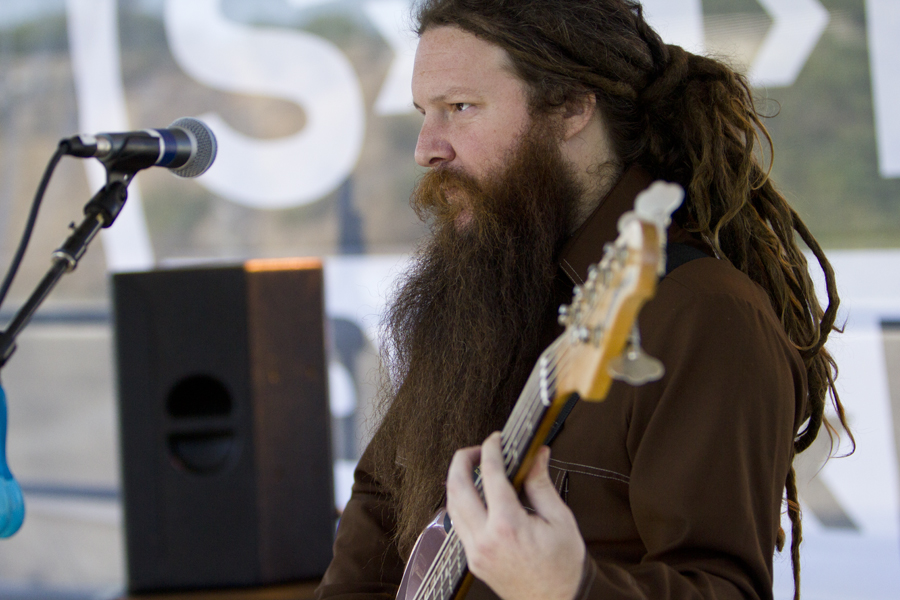
The Sub Pop Silver Jubilee is followed by an after-party thrown by its aforementioned subsidiary, Hardly Art, at a medium-sized venue called the Mix. After 12 hours of music, I’m nearly falling asleep in a lazy boy in the balcony. Austin’s Deep Time is performing, and the line is out the door and across the street, as everyone whispers about who the secret headlining guest will be. A couple of women next to me are increasingly annoyed by another group who is blocking their view. Finally, one of the women leans over to me, and yells a question over the din into my ear. “Is it OK to rage yet?,” she asks regarding the offending group. Suddenly alarmed back into working, I immediately ask if she’s from Seattle. “Born and bred,” she says boastfully. Her name is Chelsea Corbin, and she is 29 years old. Her friend, Ashley Church, is the same age. They talk over each other, excitedly taking guesses as to who the secret band will turn out to be.
“I heard it was Soundgarden,” says Corbin, which seemed to be the most popular answer. They toss out the names of various other bands, and how not only had they seen a lot of the rumored flagship acts, but also that they were raised on the music. “My dad said, ‘You would be in the car singing this,’ when I was 10,” Corbin explained.
The conversation eventually turned to how Seattle was a better environment for music festivals than most, and the Georgetown neighborhood specifically. “This is an artist community, not actually in the city,” Corbin said. “Everyone came here specifically for that; there were no major corporations.” The two went on to say that this event was much better than Sasquatch, another festival in Washington state. As to why she felt Seattle specifically handled music festivals better than other cities, Corbin was very direct. “Seattle knows how to chill the f*ck out,” she said.
Chris Flemmons also had a take on the city’s benign attitude, and offered a comparison to North Texas’ ever-present identity problem. “Between Denton, and Dallas, and Fort Worth, people don’t need to live on their sides … It doesn’t need to be feudal at any point. Everybody needs to help each other,” Flemmons said. “If you walked around long enough, around the street festival that Sub Pop put together, you saw the other labels that were getting represented there. It wasn’t just about Sub Pop. It was about the fact that there was this music community that was larger than just them.”
Flemmons finishes with an almost startling admission about Seattle, for someone so closely associated with his hometown of Denton. “It’s a beautiful town. It’s the only place, that if I were to leave here, that I would go,” Flemmons said. “I have a lot of close friends there, because of the label.” “[Chris] Webber is there and such,” Flemmons said referencing the beloved former North Texas resident who was a cofounder of such institutions as the Good/Bad Art Collective and the Rock Lottery. “There are quite a few Denton transplants there.”
Ultimately Soundgarden, or any comparable band, never showed. Once Deep Time finished, a band called the Moondoggies took the stage. The two Seattle natives that struck up a conversation are not impressed, and they leave abruptly. As they hopped into a car service vehicle, I almost felt sorry for them. Perhaps Sub Pop had to evolve so much with the times that the label couldn’t quite fulfill the promise made to them in adolescence, singing along to Dad’s CDs. But then I remembered spotting a teenager earlier in the day, waiting with high anticipation in the front row for Mudhoney to take the stage, perhaps Sub Pop’s most obvious link to the heavy sounds of its glory days. She had an electric guitar around her neck, which she strummed with little regard for the thousands of people in the crowd around her and an oversized Nirvana T-shirt, right out of 1992. She claimed to be 16, when asked for her age. The older fans went home early, but it’s of little concern. Here it was, already armed and uniformed: The next wave of child soldiers in the label’s quest for world domination. Or, at the very least, new customers.
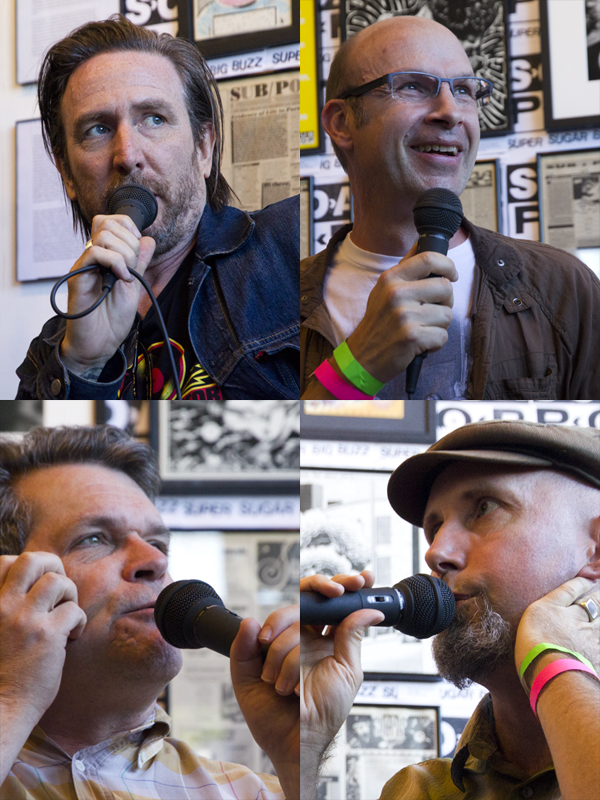
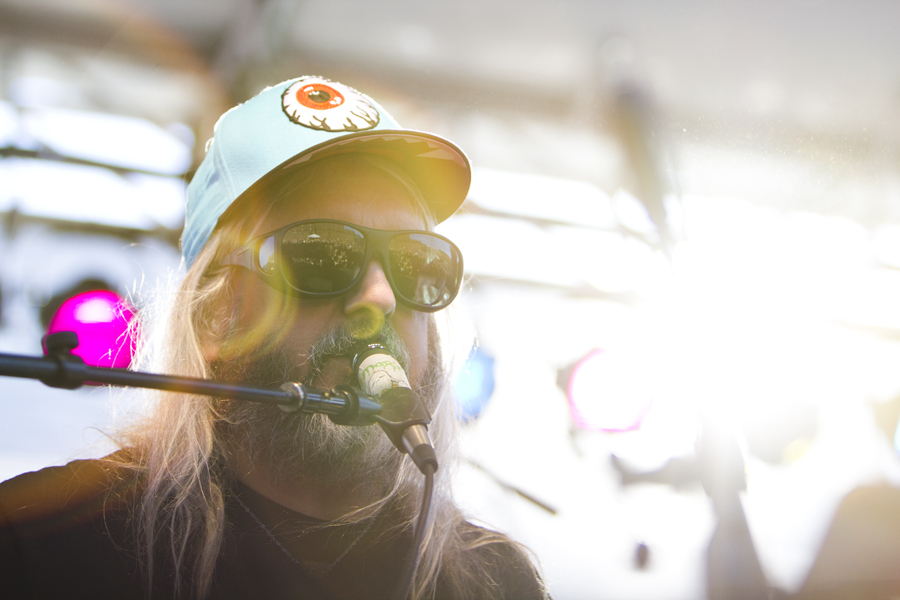




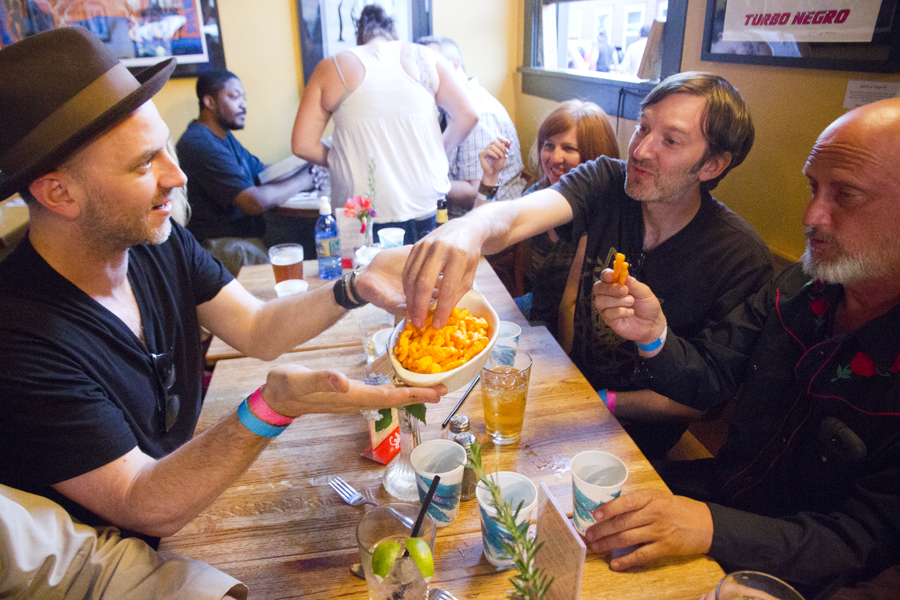
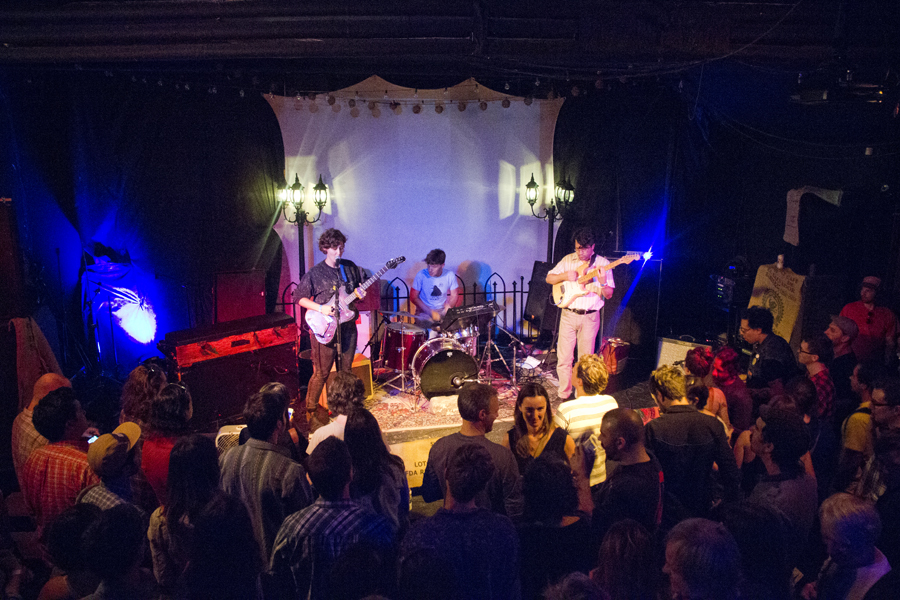

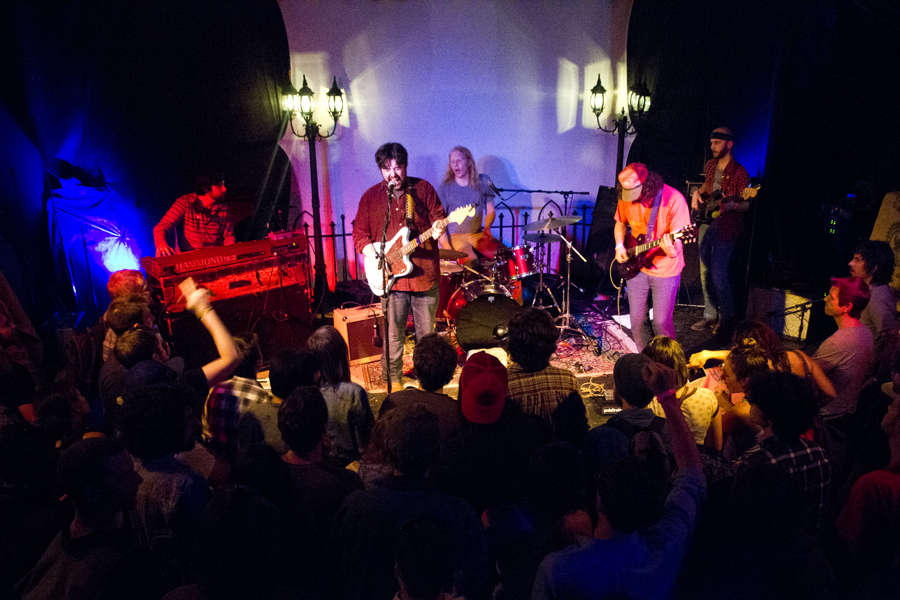
All photos by Andi Harman.


